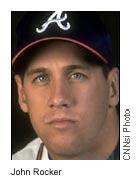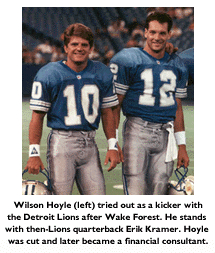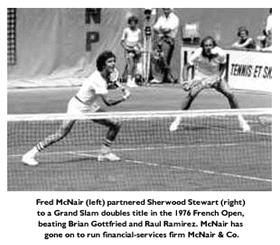|
John Rocker, stockbroker
|
 |
June 15, 2000: 6:14 a.m. ET
Could the closer quit and find relief as a stock jockey? Ex-pros say it ain't easy
By Staff Writer Alex Frew McMillan
|
NEW YORK (CNNfn) - So John Rocker wants to be a stockbroker. Or at least the baseball relief pitcher was mumbling about switching to pitching Ford shares instead of fastballs, until the Atlanta Braves recalled him to the majors Tuesday night.
But just how easy would Rocker find it making the switch from a seven-game series to the Series 7? Not very, according to other sportsmen who have tried it. Many like him have failed along the way. But some ex-athletes have shown it can be done.
A minor problem
Rocker, who was briefly relegated to the minor-league Richmond Braves due to control problems, told an Atlanta radio show he was considering a career change before he reported to the AAA team.
 "There's plenty of things I can do besides dealing with the headaches of this garbage every single day," he told The Regular Guys show. "I would be a stockbroker, probably." "There's plenty of things I can do besides dealing with the headaches of this garbage every single day," he told The Regular Guys show. "I would be a stockbroker, probably."
Rocker, 25, has been plagued by controversy ever since he slammed minorities, gays, foreigners, immigrants, people who don't speak English as their first language and young mothers, among others, in an article in Sports Illustrated magazine.
The issue boiled over again after Rocker confronted the reporter who wrote the article, Jeff Pearlman, at a Braves-Yankees game at the start of June.
Pearlman said Rocker threatened him. The Braves fined Rocker $5,000 for inappropriate conduct.
Somewhat more difficult than saying things
Despite his current troubles, though, Rocker would not likely ease them by pinch-hitting as a broker, according to Fred McNair. The former tennis professional has moved on to run his family's financial-consulting business.
"He made it sound like 'Hey, no problem, this is easy,' " McNair, 49, said. "He's being naïve. What he's doing now is easy. You can be a stockbroker for the whole rest of your life. But you can only be a baseball player at this level one time in your life."
McNair won the French Open doubles title with Sherwood Stewart in 1976. He was ranked fourth in the world at doubles the end of that year. He retired from playing in 1982 after nine years as a pro. He said he had a tough adjustment when he left sports.
"I was anxious. Although I felt I could be successful, there was uncertainty," he recalled. "The first three years I was looking for that pro job [coaching tennis] in south Florida. Because this is brutal."
Jock ain't an easy tag to shake
The first step Rocker would have to overcome is the very fact that he is a jock, according to financial consultant Wilson Hoyle. Athletes may or may not be academically gifted, but there is a stereotype that they are not very smart, he said.
 "For me, the biggest issue was credibility," Hoyle, 33, said. "People said 'Hey, we know you can kick a football straight, but I want someone with experience to manage my money." "For me, the biggest issue was credibility," Hoyle, 33, said. "People said 'Hey, we know you can kick a football straight, but I want someone with experience to manage my money."
People remembered Hoyle as a place kicker -- he left Wake Forest University as its top scorer in history to try out for the NFL. Over several years, he tried out for several pro football teams, including the Detroit Lions and San Francisco 49ers. He also played a season in the World League.
But kicking didn't pan out. The economics graduate ultimately went on to become a financial consultant.
"The biggest obstacle John Rocker would go through is, people think of him as a relief pitcher," Hoyle said. "If John Rocker was to quit baseball today and go out to manage someone's money, I don't know if they'd want that."
That's only the first hurdle for ex-athletes to clear
It isn't easy even if you are qualified, as McNair can attest. The tennis player returned to the University of North Carolina at Chapel Hill during his playing career to finish his degree, in American Studies. He wrote his thesis on the poet Robert Frost.
 McNair was steeped in financial services. His grandfather started the family business that he now runs in 1931, and his father also worked for it. After quitting tennis, McNair spent two and a-half years in a junior position at a different financial-planning company to learn the business. McNair was steeped in financial services. His grandfather started the family business that he now runs in 1931, and his father also worked for it. After quitting tennis, McNair spent two and a-half years in a junior position at a different financial-planning company to learn the business.
But he failed the Series 7 test for securities dealing the first time he took it. "I thought, 'How hard can this be?' " McNair recalled. But after a three-day course, spending eight hours a day in the classroom, he still flunked the six-hour test.
"I hadn't been exposed to limited partnerships and the Securities Act of 1934. This stuff was Chinese to me," McNair said.
After struggling through qualifying tennis events in places as alien as New Delhi and Manila, once again he was struggling, and tasting defeat. "It was quite a wake-up call."
Lots more to learn after the first step
McNair ultimately took a weeklong course near his Washington, D.C., hometown. He passed the Series 7 on his second attempt.
Though the Series 7 is the basic broker qualification, McNair has earned a series of other qualifications. He passed the Series 6 exam to sell mutual funds and group annuities and the Series 63 state securities exam around the same time. He also passed exams to sell life and health insurance, and then variable life and variable annuities.
McNair qualified as a Registered Investment Adviser by passing the Series 65 exam in 1998. Even at almost 50, he plans to take the Series 24 test to become a branch principal later this year.
"You sort of just build on the platform of accreditations," he said. "You keep sharpening the blade, polishing the stone." Luck is where opportunity meets preparedness, McNair said, whether in sports or financial services.
Sports fame can also provide a head start
In other ways, baseball might help Rocker. Tennis has opened doors for McNair. McLean, Va.-based McNair & Co. landed its first big job -- helping organize the key-man insurance and risk analysis for then-new investment bank Friedman Billings Ramsey & Co. -- because McNair was playing morning games of tennis with partner Eric Billings at the time.
Hoyle, the former place kicker, says he now has a stable of 42 athletes for whom he acts as financial consultant. He has a minimum-balance requirement of $1 million.
 He says his clients are mainly football players and include Erik Kramer, who made his name as a quarterback with the Chicago Bears but played the '99 season with the San Diego Chargers; LeRoy Butler, a defensive back with the Green Bay Packers; Ricky Proehl, a wide receiver with the St. Louis Rams; and Merril Hoge, a former fullback with the Pittsburgh Steelers and now an ESPN commentator. He says his clients are mainly football players and include Erik Kramer, who made his name as a quarterback with the Chicago Bears but played the '99 season with the San Diego Chargers; LeRoy Butler, a defensive back with the Green Bay Packers; Ricky Proehl, a wide receiver with the St. Louis Rams; and Merril Hoge, a former fullback with the Pittsburgh Steelers and now an ESPN commentator.
Hoyle admits that he is a salesman more than a money manager. "I'm the point man on the relationship," he said. He is a licensed brokerage consultant. But he and the company he is employed by, Raleigh, N.C.-based CapTrust LLC, hire and fire money managers rather than managing clients' money directly.
Still, there is a lot of demand for ex-athletes at companies such as his because they have connections to a wealthy pool of potential clients, he said. And a lot of athletes try their hand at it. But the brokerage turnover rate is high.
"I can name about 10 people who tried and didn't make it," Hoyle said, with companies such as Salomon Smith Barney. "Guys are always looking at the industry. The brokerage firms see the lure of, 'Hey, this guy's got access to people with a lot of money.' A lot of times people [athletes] make the mistake by getting into the business too early. This business is tough."
The competition is welcome
Some welcome the challenge. Derrick Rostagno, who spent around nine years on the pro tennis circuit, completed his undergrad degree at Stanford when he retired in 1996. Rostagno, now 34, went on to get an MBA at UCLA's Anderson Graduate School of Management.
After working in leveraged buyouts at a private-equity investment company, Rostagno now wants to work in corporate finance. He finds his experience in the tennis world gives him the drive to do well in a more cerebral career.
"I was completely ready to sit down at a desk and exercise the mind more," he said. "There came a point that the strategy and that type of thing in tennis wasn't enough. You weren't using your mind all day."
"There was a lot of physical work but maybe not the right balance," Rostagno said.
The athletes who are successful moving from jocks to stocks see it as another challenge, ex-pros say. Investment bankers and brokers are also famous for their ambition and occasional cutthroat behavior.
"Naturally most sportsmen who can make the transition have a fire in the belly," McNair said. More than a few stockbrokers would like competing with Rocker, McNair added. "It's much like being a financial gladiator -- or an athletic gladiator."
Would anyone have Rocker?
Perhaps Rocker would enjoy a more academic challenge. Rocker studied political science at Mercer University in Macon, Ga., but left without his degree.
Technically it is not necessary to have a bachelor's to take the Series 7 -- you only have to be over 18 and be able to pass.
There are now 620,387 registered representatives, the technical term for brokers, in the United States, according to the Securities Industry Association. They work at 5,482 securities firms.
Would any welcome Rocker? Some pro athletes interviewed for this story doubted his maturity. Many Wall Streeters were touchy about touching Rocker's proposed new career. After all, Rocker also criticized New York, home of many of the largest brokerages, in the Sports Illustrated article.
What would it take for Rocker to be hired at PaineWebber, a company that specializes in managing high net-worth clients? "I can't give you that right now," a PaineWebber spokesman said.
Would it help if the spokesman had more time to get the answer? "I'm not confident in that," the spokesman said. Other securities-industry insiders dodged the question entirely.
Dan Hubbard, a spokesman for Charles Schwab & Co., said that at a minimum stockbrokers have to pass the Series 7 exam and take a four- to five-month training program.
But Hubbard said that Schwab brokers almost always do have at least an undergrad degree. They also have to undergo extensive interviews before Schwab will hire them and sponsor them for the Series 7. Schwab brokers have to have the "set of traits and skills that make you successful in this particular field," Hubbard said, before they're considered for the job.
Rocker now quiet on the subject
Attempts to contact Rocker to see if he is serious about trading his baseball glove for a briefcase were unsuccessful. His agent did not return phone calls.
Rocker "is pretty much off-limits to the media," Richmond Braves spokesman John Swierz said. Rocker avoided contact with reporters during his six-day stay with Richmond, where he pitched three stints against teams such as the Toledo Mud Hens.
"He won't be doing any speaking with the media or anything like that," Swierz explained.
The Braves organization generally downplayed Rocker's remarks, both that he was considering quitting baseball and that he was keen on becoming a broker.
"I think it's more frustration, getting sent down to the minors," said a spokesman for the Atlanta Braves, who are owned by Time Warner (TWX: Research, Estimates), the parent company of CNNfn.com. He was recalled after an injury to pitcher Rudy Seanez.
That may prove a welcome reprieve. To aspire to the same success that he is enjoying as a baseball player would take years of work as a stockbroker -- or in any other profession -- according to McNair.
"It has taken years and years and years of applying his talent and his mental desire to just get to the major leagues," McNair said. "And it just shows how fragile it is. You can blow it fairly easily."
Of course, transition is a fact of life for all sports players in the end, the ex-tennis player pointed out. But that doesn't make starting or succeeding at a new profession easy.
"It's every bit as difficult as what he's doing now," McNair said. "He simply doesn't know." 
-- Click here to send email to Alex Frew McMillan
|
|
|
|
|
 |

|

